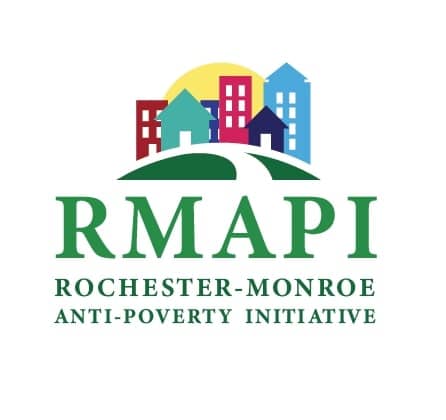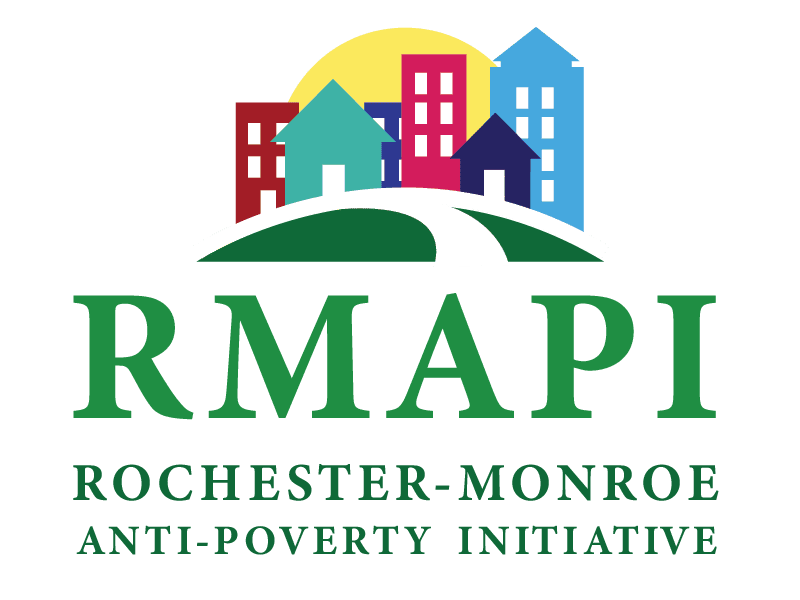RMAPI 2019 Policy Agenda

Rochester, NY—The Rochester-Monroe Anti-Poverty Initiative has developed a list of policy priorities for 2019 with actions aimed at addressing the root causes of poverty.
These policy priorities were developed by RMAPI’s Policy Working Group after several months of meeting with local experts, community and government leaders, and representatives from non-profit agencies to determine which actions would be the most effective and the most needed to address poverty.
The policy priorities for 2019 include:
Bail Reform
RMAPI supports bail reform on a statewide level that allows people accused of misdemeanors and non-violent felony offenses to remain in their communities while facing trial. Every day, there are tens of thousands of low-income New Yorkers remanded to local jails on bail amounts they cannot afford—sometimes relatively small amounts. Between 2010 and 2014, more than 17,000 people in Monroe County were held on bail amounts less than $2,500.
To address this inequity, bail reform legislation has been submitted by Governor Andrew Cuomo as well as the state Senate and Assembly. All of the proposed bills would end the use of cash bail for persons accused of committing misdemeanors and non-violent felony offenses.
Why Eliminate Cash Bail?
People who detained pretrial are more likely to lose jobs, housing, and other benefits. They are also more likely to be re-arrested, convicted, and receive longer sentences. The cost to the entire community to detain individuals who have not been convicted of any crime is much greater.
Eviction Prevention
RMAPI supports efforts that create a safety net for individuals facing possible eviction, supporting measures that allow them to stay in their homes.
There are two aspects to the eviction prevention proposal supported by RMAPI:
- Changing the regulations governing Emergency Assistance to Families and Emergency Safety Net Assistance (ESNA) to provide greater flexibility in providing assistance.
- Expand New York City’s Right to Counsel Law to the rest of the state. This program increases access to representation that helps keep families in their homes and reduces housing instability.
How will these policies prevent evictions?
These policies improve family stability while minimizing the often tedious work that families face when dealing with the eviction process. These proposals also reduce stress on the emergency housing system by keeping people off of public assistance and allowing them to remain in their homes.
Low Income Family Tax Credits
RMAPI supports a series of policy changes aimed at reducing child poverty and making work pay for low-wage working families. The changes include:
–Expanding the state’s child tax credit (Empire State Child Credit) to cover children under the age of four, and doubling the credit for young children.
–Expanding and strengthening the state’s Earned Income Tax Credit (EITC) by increasing the percentage of the federal credit paid to families and expanding the credit for young adults without children (under the age of 25).
–Doubling the amount of child care expenses creditable under the state’s Child and Dependent Care Tax Credit (CDCTC) to better reflect the true cost of care and enable more middle-income families to afford high-quality child care.
How will these policies help low-income families?
Refundable tax credits build family economic security and independence and pull families and children out of poverty. They are structured to encourage work, either by increasing as earnings increase to a point, or by making child care costs less of a barrier to parental employment.
RGRTA (RTS) Funding
RMAPI supports a proposed statewide transit action plan that would increase operating aid for RGRTA by 50 percent over the next five years starting with a 10 percent increase in 2019-20. The total increase for RGRTA over the five years would be $20 million dollars.
How will these policies support poverty reduction?
People living in poverty are disproportionately affected by issues related to transportation. Additional funding would enable RTS to expand existing coverage, providing a link to jobs in parts of the region that are currently underserved or not served at all by public transit. In addition, expanded public transportation coverage and connections would increase access to health care and education assets and other key destinations that ensure better quality of life for residents no matter where they live. Additional funding will also allow for geographic expansion of service for people with disabilities and development of additional mobility options to improve flexibility and access.
